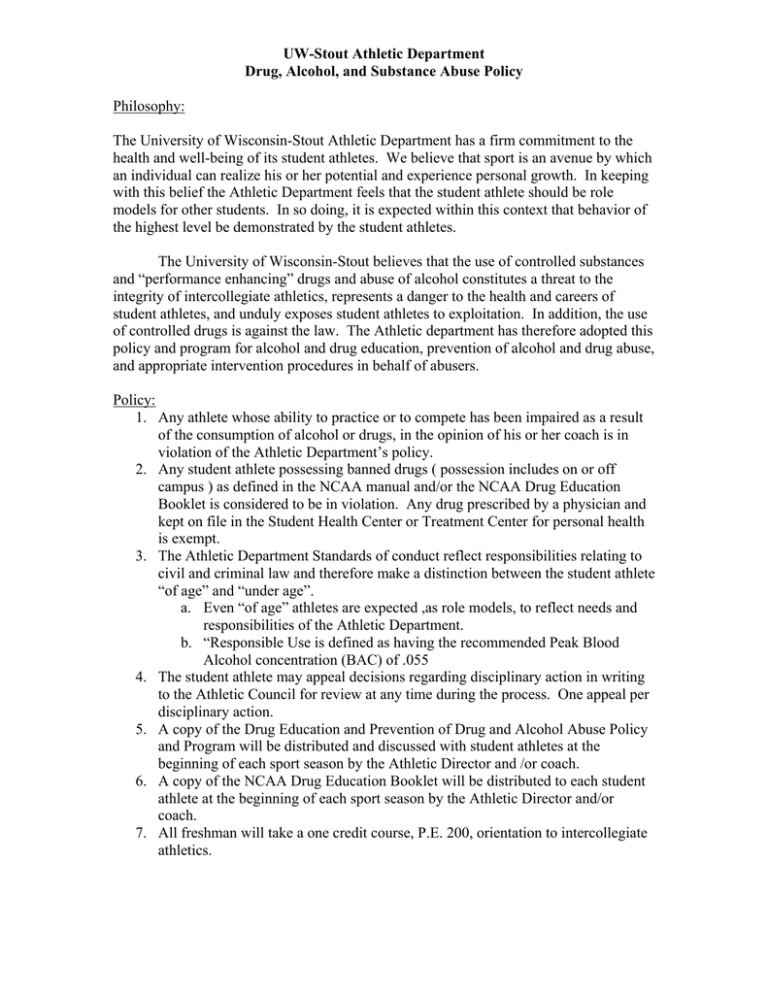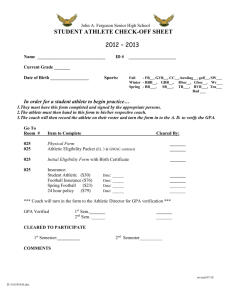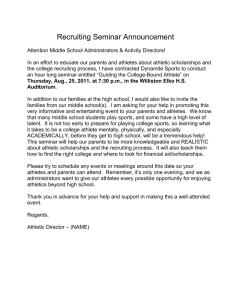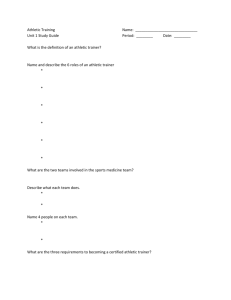UW-Stout Athletic Department Drug, Alcohol, and Substance Abuse Policy Philosophy:
advertisement

UW-Stout Athletic Department Drug, Alcohol, and Substance Abuse Policy Philosophy: The University of Wisconsin-Stout Athletic Department has a firm commitment to the health and well-being of its student athletes. We believe that sport is an avenue by which an individual can realize his or her potential and experience personal growth. In keeping with this belief the Athletic Department feels that the student athlete should be role models for other students. In so doing, it is expected within this context that behavior of the highest level be demonstrated by the student athletes. The University of Wisconsin-Stout believes that the use of controlled substances and Òperformance enhancingÓ drugs and abuse of alcohol constitutes a threat to the integrity of intercollegiate athletics, represents a danger to the health and careers of student athletes, and unduly exposes student athletes to exploitation. In addition, the use of controlled drugs is against the law. The Athletic department has therefore adopted this policy and program for alcohol and drug education, prevention of alcohol and drug abuse, and appropriate intervention procedures in behalf of abusers. Policy: 1. Any athlete whose ability to practice or to compete has been impaired as a result of the consumption of alcohol or drugs, in the opinion of his or her coach is in violation of the Athletic DepartmentÕs policy. 2. Any student athlete possessing banned drugs ( possession includes on or off campus ) as defined in the NCAA manual and/or the NCAA Drug Education Booklet is considered to be in violation. Any drug prescribed by a physician and kept on file in the Student Health Center or Treatment Center for personal health is exempt. 3. The Athletic Department Standards of conduct reflect responsibilities relating to civil and criminal law and therefore make a distinction between the student athlete Òof ageÓ and Òunder ageÓ. a. Even Òof ageÓ athletes are expected ,as role models, to reflect needs and responsibilities of the Athletic Department. b. ÒResponsible Use is defined as having the recommended Peak Blood Alcohol concentration (BAC) of .055 4. The student athlete may appeal decisions regarding disciplinary action in writing to the Athletic Council for review at any time during the process. One appeal per disciplinary action. 5. A copy of the Drug Education and Prevention of Drug and Alcohol Abuse Policy and Program will be distributed and discussed with student athletes at the beginning of each sport season by the Athletic Director and /or coach. 6. A copy of the NCAA Drug Education Booklet will be distributed to each student athlete at the beginning of each sport season by the Athletic Director and/or coach. 7. All freshman will take a one credit course, P.E. 200, orientation to intercollegiate athletics. Rules: 1. Absolutely no use of illegal drugs or controlled substances at any time on or off campus during the season or out of season. 2. No alcoholic beverages are allowed at practices, games, or during travel when representing the University. 3. Abuse of alcohol at any time is not permitted. 4. The use of tobacco, in any form, is strongly discouraged. 5. No tobacco is allowed at practice, games or during travel when representing the University. ANY STUDENT ATHLETE FOUND IN VIOLATION OF THE ABOVE POLICY AND RULES WILL BE PLACED INTO THE PROGRAM THAT FOLLOWS: PROGRAM PROCEDURES Step 1. The coach is primarily responsible to be alert to and aware of controlled substance and/or alcohol abuse by his or her student athletes. The detection and/or determination of the abuse by a student athlete will initiate: a. Complete documentation of the incident by the coach to include: date and time of incident, substance abused, influence on team, behavior pattern and actions of student athletes. b. If the student athleteÕs ability to practice or compete is impaired as a result of the abuse of a drug the student athlete shall be removed from the event immediately. c. A meeting with the coach, athletic director, and the student athlete to determine the problem, the extent of the problem, and the steps to be taken to correct the problem. This meeting shall occur within 72 hours of the incident. d. At anytime the coach has the discretion to implement disciplinary action as he or she deems necessary. Step 2. A meeting with the ÒcouncilÓ (Athletic Director, student athlete, alcohol and Other Drug Representative selected by the student athlete. This meeting will determine the problem, the extent of the problem, and the steps to be taken to correct the problem. This committee may ask the student athlete to undergo drug and or alcohol evaluation as a part of the program. a. Failure to correct the problem as outlined in the first meeting will initiate a meeting of the same committee. This committee will continue to monitor and to work with the student athlete to determine corrective procedures. If there is insufficient progress being made, the committee will mandate appropriate procedures. These procedures will respect the student athleteÕs rights as well as the UniversityÕs responsibilities. Step 3 a. If the procedures in the steps above have not been followed and the committee still feels that unsatisfactory progress is being made, it may declare the student athlete ineligible or any other action deemed necessary. b. At any time during the above process, the committee will have the option to request an unannounced drug test. The University will cover all costs for the initial drug test and any other drug test will be the student athleteÕs responsibility.



